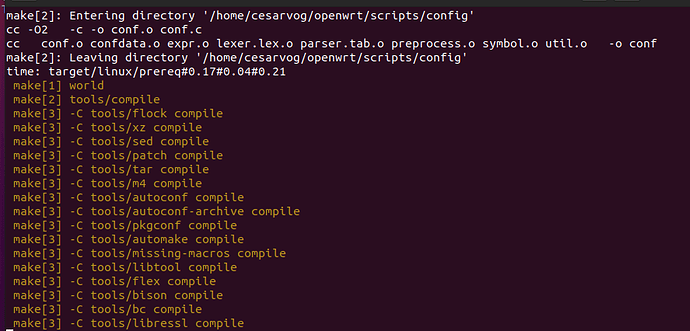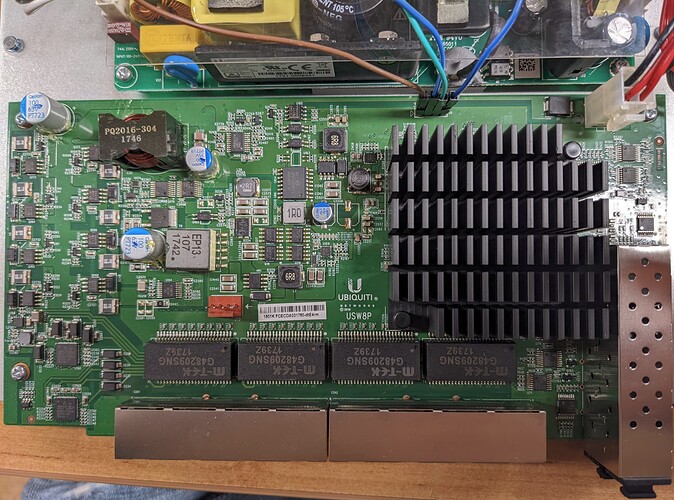Here is the output of the dmesg command from the "defective" switch, taken from the Linux command line right after the "defective" switch booted from it's default OS, and right before it rebooted from because of the PSE error. I don't know much about it, but looks to me that no error is found beside something the Ubiquiti programed to be verified during the INIT sequence. Sorry if this sounds confusing, English is not my native language.
I'm going to try to capture a lsmod output next. I'll have to try a few times, because there's a very short period of time after the PSE error is encountered in the INIT sequence, where I have to provide the username and password, and the command I wish to capture the output has to end, before the unit restarts automatically.
UBNT-US.v4.0.18# dmesg
[ 0.000000] Booting Linux on physical CPU 0
[ 0.000000] Linux version 3.6.5 (builder@owrt1505-us48p) (gcc version 4.7.2 (OpenWrt GCC 4.7.2 unknown) ) #1 SMP Wed Jan 16 18:09:43 MST 2019
[ 0.000000] CPU: ARMv7 Processor [414fc091] revision 1 (ARMv7), cr=10c53c7d
[ 0.000000] CPU: PIPT / VIPT nonaliasing data cache, VIPT aliasing instruction cache
[ 0.000000] Machine: Broadcom iProc
[ 0.000000] Memory policy: ECC disabled, Data cache writealloc
[ 0.000000] BUG: mapping for 0x18000000 at 0xf0000000 out of vmalloc space
[ 0.000000] BUG: mapping for 0x19000000 at 0xf1000000 out of vmalloc space
[ 0.000000] On node 0 totalpages: 65536
[ 0.000000] free_area_init_node: node 0, pgdat c0e8d040, node_mem_map c0ebe000
[ 0.000000] Normal zone: 256 pages used for memmap
[ 0.000000] Normal zone: 0 pages reserved
[ 0.000000] Normal zone: 32512 pages, LIFO batch:7
[ 0.000000] HighMem zone: 3328 pages used for memmap
[ 0.000000] HighMem zone: 29440 pages, LIFO batch:7
[ 0.000000] smp_init_cpus: Enter ncores 1
[ 0.000000] smp_init_cpus: Leave ncores 1
[ 0.000000] PERCPU: Embedded 7 pages/cpu @c1cc7000 s6272 r8192 d14208 u32768
[ 0.000000] pcpu-alloc: s6272 r8192 d14208 u32768 alloc=8*4096
[ 0.000000] pcpu-alloc: [0] 0
[ 0.000000] Built 1 zonelists in Zone order, mobility grouping on. Total pages: 61952
[ 0.000000] Kernel command line: console=ttyS0,115200 mem=128M@0x0 mem=128M@0x68000000 mtdparts=spi1.0:768k(u-boot),64k(u-boot-env),64k(shmoo),15360k(kernel0),15424k(kernel1),1024k(cfg),64k(EEPROM) ubntbootid=0 ubootver=usw-v1.1.4.115-g14af1ee6
[ 0.000000] PID hash table entries: 512 (order: -1, 2048 bytes)
[ 0.000000] Dentry cache hash table entries: 16384 (order: 4, 65536 bytes)
[ 0.000000] Inode-cache hash table entries: 8192 (order: 3, 32768 bytes)
[ 0.000000] Memory: 128MB 128MB = 256MB total
[ 0.000000] Memory: 244896k/244896k available, 17248k reserved, 131072K highmem
[ 0.000000] Virtual kernel memory layout:
[ 0.000000] vector : 0xffff0000 - 0xffff1000 ( 4 kB)
[ 0.000000] fixmap : 0xfff00000 - 0xfffe0000 ( 896 kB)
[ 0.000000] vmalloc : 0xc8800000 - 0xf0000000 ( 632 MB)
[ 0.000000] lowmem : 0xc0000000 - 0xc8000000 ( 128 MB)
[ 0.000000] pkmap : 0xbfe00000 - 0xc0000000 ( 2 MB)
[ 0.000000] modules : 0xbf000000 - 0xbfe00000 ( 14 MB)
[ 0.000000] .text : 0xc0018000 - 0xc034d7f0 (3286 kB)
[ 0.000000] .init : 0xc034e000 - 0xc0e64880 (11355 kB)
[ 0.000000] .data : 0xc0e66000 - 0xc0e8ed40 ( 164 kB)
[ 0.000000] .bss : 0xc0e8ed64 - 0xc0ebd354 ( 186 kB)
[ 0.000000] SLUB: Genslabs=11, HWalign=64, Order=0-3, MinObjects=0, CPUs=1, Nodes=1
[ 0.000000] Hierarchical RCU implementation.
[ 0.000000] RCU restricting CPUs from NR_CPUS=4 to nr_cpu_ids=1.
[ 0.000000] NR_IRQS:292
[ 0.000000] Clock Div = 0x2012
[ 0.000000] Active frequency ID 6
[ 0.000000] a9pll0_status: clk 0xc0e7c0f8
[ 0.000000] parent rate 25000000
[ 0.000000] Clock divisor 4
[ 0.000000] Clock rate 400000005
[ 0.000000] Clock Div = 0x2012
[ 0.000000] Active frequency ID 6
[ 0.000000] Clock divisor 2
[ 0.000000] Clock rate 200000002
[ 0.000000] iproc_clocksource_init: CPU global timer freq 200000002
[ 0.000000] cpu_clk_freq: 200000002
[ 0.000000] HZ: 100, ticks_per_jiffy: 2000000
[ 0.000000] sched_clock: 32 bits at 100 Hz, resolution 10000000ns, wraps every 4294967286ms
[ 0.010000] Calibrating delay loop... 795.44 BogoMIPS (lpj=3977216)
[ 0.050000] pid_max: default: 4096 minimum: 301
[ 0.050000] Mount-cache hash table entries: 512
[ 0.050000] CPU: Testing write buffer coherency: ok
[ 0.050000] CPU0: thread -1, cpu 0, socket 0, mpidr 80000000
[ 0.050000] Setting up static identity map for 0x282250 - 0x2822a8
[ 0.050000] L310 cache controller enabled
[ 0.050000] l2x0: 8 ways, CACHE_ID 0x410000c9, AUX_CTRL 0x0a120000, Cache size: 131072 B
[ 0.050000] Brought up 1 CPUs
[ 0.050000] SMP: Total of 1 processors activated (795.44 BogoMIPS).
[ 0.050000] devtmpfs: initialized
[ 0.060000] NET: Registered protocol family 16
[ 0.060000] DMA: preallocated 256 KiB pool for atomic coherent allocations
[ 0.060000] board_init: Enter
[ 0.060000] GENPLL[5] mdiv=40 rate=2000000000
[ 0.060000] Sel=1 Ovr=1 Div=48
[ 0.060000] UART clock rate 50000000
[ 0.060000] board_init: Leave
[ 0.080000] bio: create slab <bio-0> at 0
[ 0.080000] Bluetooth: Core ver 2.16
[ 0.080000] NET: Registered protocol family 31
[ 0.080000] Bluetooth: HCI device and connection manager initialized
[ 0.080000] Bluetooth: HCI socket layer initialized
[ 0.080000] Bluetooth: L2CAP socket layer initialized
[ 0.080000] Bluetooth: SCO socket layer initialized
[ 0.080000] Switching to clocksource iproc_gtimer
[ 0.090000] NET: Registered protocol family 2
[ 0.090000] TCP established hash table entries: 4096 (order: 3, 32768 bytes)
[ 0.090000] TCP bind hash table entries: 4096 (order: 3, 32768 bytes)
[ 0.090000] TCP: Hash tables configured (established 4096 bind 4096)
[ 0.090000] TCP: reno registered
[ 0.090000] UDP hash table entries: 128 (order: 0, 4096 bytes)
[ 0.090000] UDP-Lite hash table entries: 128 (order: 0, 4096 bytes)
[ 0.090000] NET: Registered protocol family 1
[ 0.090000] PCI: CLS 0 bytes, default 64
[ 14.570000] pm_init: Initializing Power Management ....
[ 14.570000] iproc gpiochip add GPIOA
[ 14.570000] GPIOA:ioaddr f0000060
[ 14.570000] GPIOA:intr_ioaddr f0000000 dmu_ioaddr (null)
[ 14.820000] PCIE0: LINKSTA reg 0xbe val 0x1001
[ 14.820000] reg[0xac]=0x10, reg[0xae]=0x42, reg[0xb0]=0x8000, reg[0xb4]=0x2c10, reg[0xb6]=0x10, reg[0xb8]=0x5c12, reg[0xba]=0x65, reg[0xbe]=0x1001, reg[0xc6]=0x40, reg[0xca]=0x1, reg[0xd0]=0x1f, reg[0xd2]=0x8, reg[0xdc]=0x2, PCIE0 link=0
[ 15.170000] PCIe port 1 in End-Point mode - ignored
[ 15.170000] Registering iproc_pmu_device
[ 15.170000] bounce pool size: 64 pages
[ 15.190000] squashfs: version 4.0 (2009/01/31) Phillip Lougher
[ 15.190000] jffs2: version 2.2. (NAND) © 2001-2006 Red Hat, Inc.
[ 15.190000] msgmni has been set to 222
[ 15.190000] Block layer SCSI generic (bsg) driver version 0.4 loaded (major 254)
[ 15.190000] io scheduler noop registered
[ 15.190000] io scheduler deadline registered (default)
[ 15.190000] io scheduler cfq registered
[ 15.190000] Serial: 8250/16550 driver, 2 ports, IRQ sharing enabled
[ 15.200000] serial8250.0: ttyS0 at MMIO 0x18000400 (irq = 123) is a 16550A
[ 15.670000] console [ttyS0] enabled
[ 15.680000] serial8250.0: ttyS1 at MMIO 0x18000300 (irq = 123) is a 16550A
[ 15.710000] brd: module loaded
[ 15.720000] loop: module loaded
[ 15.730000] nbd: registered device at major 43
[ 15.750000] tun: Universal TUN/TAP device driver, 1.6
[ 15.760000] tun: (C) 1999-2004 Max Krasnyansky <maxk@qualcomm.com>
[ 15.760000] Bluetooth: HCI UART driver ver 2.2
[ 15.770000] Bluetooth: HCI H4 protocol initialized
[ 15.770000] Bluetooth: HCI BCSP protocol initialized
[ 15.780000] TCP: cubic registered
[ 15.780000] NET: Registered protocol family 10
[ 15.790000] sit: IPv6 over IPv4 tunneling driver
[ 15.800000] NET: Registered protocol family 17
[ 15.800000] Bluetooth: RFCOMM TTY layer initialized
[ 15.810000] Bluetooth: RFCOMM socket layer initialized
[ 15.810000] Bluetooth: RFCOMM ver 1.11
[ 15.820000] Bluetooth: BNEP (Ethernet Emulation) ver 1.3
[ 15.820000] Bluetooth: BNEP filters: protocol multicast
[ 15.830000] Bluetooth: HIDP (Human Interface Emulation) ver 1.2
[ 15.830000] 8021q: 802.1Q VLAN Support v1.8
[ 15.840000] GENPLL[5] mdiv=40 rate=2000000000
[ 15.840000] qspi_iproc qspi_iproc.1: 1-lane output, 3-byte address
[ 15.850000] m25p80 spi1.0: found mx25l25635e, expected m25p80
[ 15.860000] m25p80 spi1.0: mx25l25635e (32768 Kbytes)
[ 15.860000] 7 cmdlinepart partitions found on MTD device spi1.0
[ 15.870000] Creating 7 MTD partitions on "spi1.0":
[ 15.870000] 0x000000000000-0x0000000c0000 : "u-boot"
[ 15.880000] 0x0000000c0000-0x0000000d0000 : "u-boot-env"
[ 15.890000] 0x0000000d0000-0x0000000e0000 : "shmoo"
[ 15.890000] 0x0000000e0000-0x000000fe0000 : "kernel0"
[ 15.900000] 0x000000fe0000-0x000001ef0000 : "kernel1"
[ 15.910000] 0x000001ef0000-0x000001ff0000 : "cfg"
[ 15.920000] 0x000001ff0000-0x000002000000 : "EEPROM"
[ 15.920000] creating /proc/iproc-pse
[ 15.920000] /proc/iproc-pse/enable
[ 15.950000] Freeing init memory: 11352K
[ 15.990000] ubnt_common: module license 'Proprietary' taints kernel.
[ 15.990000] Disabling lock debugging due to kernel taint
[ 16.070000] creating procfs for ubnthal
[ 16.070000] creating proc entry for system.info
[ 16.070000] creating proc entry for board
[ 16.070000] creating procfs for status
[ 16.070000] creating proc entry for IsDefault
[ 16.070000] creating proc entry for IsLocated
[ 16.070000] creating proc entry for IsIsolated
[ 16.080000] gpiodev: reset_timeout=3
[ 16.090000] creating /proc/gpio/
[ 16.090000] /proc/gpio/ledbar_control
[ 16.090000] /proc/gpio/led_pattern
[ 16.090000] /proc/gpio/led_tempo
[ 16.090000] /proc/gpio/poe_passthrough
[ 16.090000] /proc/gpio/resetbtn
[ 16.090000] /proc/gpio/resetbtn_age
[ 16.340000] Ubiquiti: system 0xeb21 revision 7

